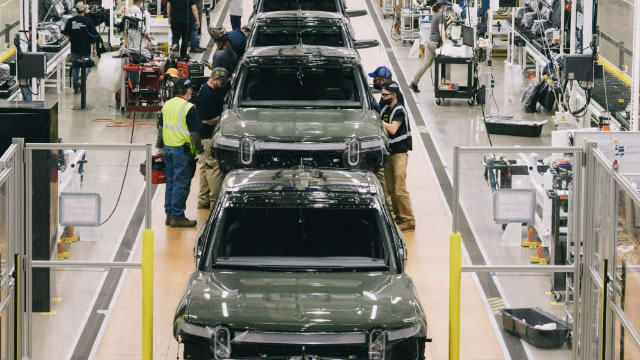Rivian’s U.S. Manufacturing: A Strategic Move Amidst Tariffs and Component Sourcing
Rivian, the electric vehicle (EV) startup, has made headlines with its strategic decision to manufacture its vehicles in the United States. This move limits the company’s exposure to the 25% tariffs that the U.S. government imposed on imported EVs from China. However, this decision comes with its own set of challenges and opportunities.
Margin Pressures from Imported Components
Despite manufacturing its vehicles in the U.S., Rivian still relies on imported components from Tier 2 and Tier 3 suppliers. These components, which include batteries and critical software, are essential for the production of Rivian’s EVs. The tariffs on these imported components could lead to significant margin pressures for the company.
Strong Upside from Software Segment
Despite the potential margin pressures, Rivian is expected to see a strong upside from its software segment. The company’s software suite, which includes features like over-the-air updates and advanced driver assistance systems (ADAS), could generate up to $1 billion in revenue this year alone. With a gross margin of 30%, this segment could help offset the margin pressures from imported components.
Regulatory Risks
One of the significant risks facing Rivian is regulatory risks. The company’s revenue projections for 2025 are contingent on the continuation of the $7,500 EV credit and regulatory credits. However, there is a possibility that these credits could be eliminated, which would significantly impact Rivian’s revenue.
Impact on Consumers
The impact of Rivian’s manufacturing decision on consumers is twofold. On the one hand, the company’s decision to manufacture in the U.S. could lead to lower tariffs and, therefore, lower prices for its vehicles. On the other hand, the potential elimination of the EV credit could make Rivian’s vehicles more expensive for some consumers.
Impact on the World
Rivian’s manufacturing decision could have a significant impact on the global EV market. By limiting its exposure to tariffs, Rivian could set a trend for other EV manufacturers to follow suit and manufacture their vehicles in the U.S. or other countries with favorable trade policies. This could lead to a more competitive EV market, with lower prices and more options for consumers.
Conclusion
Rivian’s decision to manufacture its vehicles in the U.S. is a strategic move that limits the company’s exposure to tariffs while also presenting challenges and opportunities. The potential margin pressures from imported components could be offset by the strong upside from the software segment. However, regulatory risks, particularly the potential elimination of the EV credit, could significantly impact Rivian’s revenue projections. The impact of Rivian’s manufacturing decision on consumers and the world could be significant, with potential implications for the global EV market.
- Rivian manufactures vehicles in the U.S. to limit exposure to tariffs
- Potential margin pressures from imported components
- Strong upside from software segment
- Regulatory risks, particularly the potential elimination of the EV credit
- Impact on consumers: lower prices with potential higher costs
- Impact on the world: potential for more competitive EV market





